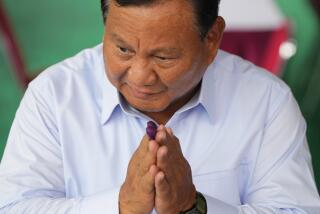Indonesia Deporting U.S. Human Rights Advocate
- Share via
JAKARTA, Indonesia — An American human rights advocate and terrorism expert said Wednesday that she had been ordered to leave the country within days because of a complaint lodged by Indonesia’s intelligence agency about her work.
Sidney Jones, the Southeast Asia director of the Brussels-based International Crisis Group who has written groundbreaking reports on the Jemaah Islamiah terrorist network, said she had not been informed of the charges and remained uncertain why she was being deported.
“We’re still mystified, completely mystified by what is taking place,” Jones told reporters.
The deportation order has alarmed democracy advocates, who fear the return of the kind of arbitrary and autocratic government actions that were common during the 32-year military dictatorship of President Suharto, which ended in 1998.
“This is a very bad precedent,” said Todung Mulya Lubis, a prominent Indonesian lawyer and chairman of the International Crisis Group’s board in Indonesia. “This is precisely the policy that took place during the Suharto years.
“We are entering into a dark and gloomy political situation in Indonesia,” he said. “This is a broad attack on freedom of expression, on democracy and human rights in Indonesia.”
Jones, 52, who once studied in Indonesia and is fluent in Indonesian, worked for more than a decade as Asia director of New York-based Human Rights Watch.
She returned to Indonesia two years ago to take the post with the International Crisis Group, which gets much of its funding from foreign governments.
Since her arrival, the group has produced a series of reports on conflicts in Aceh, Papua and other parts of Indonesia as well as on the Islamic terrorist network, establishing her as a leading expert on Indonesian affairs.
Jones said she had heard through unofficial channels that Gen. Abdullah Hendropriyono, head of the National Intelligence Agency, had complained that she had criticized the government for its handling of Aceh and Papua -- two remote parts of Indonesia where the military is attempting to suppress separatist movements.
Hendropriyono has reportedly said that the human rights group’s reports were not all true and damage the country’s image, but the specifics of his complaint have not been made public.
For months, Jones said, Hendropriyono has declined her requests to meet with him.
The International Crisis Group is one of 20 nongovernmental organizations recently placed on a watch list by the government because they allegedly pose a threat to the country’s security.
Jones, who is being expelled along with an Australian assistant, said she had received an outpouring of support. One Indonesian man offered to marry her so that she could remain in the country, she said.
“We’ve been overwhelmed by support from Indonesians and non-Indonesians,” she said. “And people representing every sector of Indonesian society have written or called us to give sympathy or expressed dismay over our deportation.”
Even the Indonesian Mujahedin Council, an extremist group with ties to Jemaah Islamiah, said Jones’ guilt had not been established.
She should not be deported, at least until after police have questioned her about her reports, a spokesman for the group said.
International Crisis Group President Gareth Evans, a former Australian foreign minister, said, “The expulsion order is outrageous and indefensible, utterly at odds with Indonesia’s claim to be an open and democratic society, and is bound to damage Indonesia’s reputation far more than ICG’s.”
Jones said she would leave the country in the next few days but hopes to return and resume work when the political climate improves. Indonesia is holding its first direct presidential election in July, with a likely runoff between the top two finishers in September.
Despite her deportation, Jones said she was optimistic about Indonesia’s long-term future and the development of a democratic political system.
“I don’t think the Indonesian public is going to allow the return of the dark days,” she said. “They have setbacks like this, but it does not deflect from the move toward a more open political future for Indonesia.”
More to Read
Sign up for Essential California
The most important California stories and recommendations in your inbox every morning.
You may occasionally receive promotional content from the Los Angeles Times.













